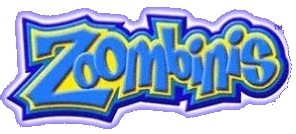
Zoombinis is a series of educational puzzle computer games that were originally developed by TERC and published by Broderbund until The Learning Company bought Broderbund in 1998 and took over developing and publishing the series in 2001. The series consists of three games: Logical Journey of the Zoombinis (1996), Zoombinis: Mountain Rescue (2001), and Zoombinis: Island Odyssey (2002). On August 6, 2015, Logical Journey was updated and re-released for tablets and modern operating systems by TERC, FableVision, and Learning Games Network. The series focuses on the Zoombinis, small blue creatures each with different appearances and personalities, which the player must guide through strange puzzle-filled lands.

Brain Age: Train Your Brain in Minutes a Day!, also known as Dr. Kawashima's Brain Training: How Old Is Your Brain? in PAL regions, and Daily DS Brain Training in South Korea, is an entertainment puzzle video game. It was developed and published by Nintendo for the Nintendo DS. Nintendo has stated that it is an entertainment product 'inspired' by Ryuta Kawashima's work in the neurosciences.

Back to the Future Part II & III is a 1990 video game for the Nintendo Entertainment System based on the second and third films in the Back to the Future trilogy. The game was produced by Beam Software and published by Acclaim Entertainment under their LJN label.
High-speed railway track construction is the process by which Lignes à Grandes Vitesses, the land on which TGV trains are to run, is prepared for their use, involving carving the track bed and laying the track. This construction technique is used both for the French TGV network and other TGV-based networks outside of France.
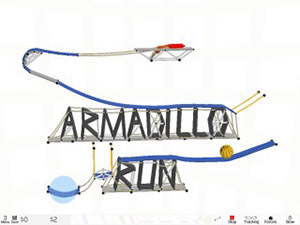
Armadillo Run is a puzzle video game created by Peter Stock.
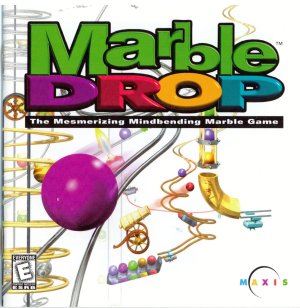
Marble Drop is a puzzle video game published by Maxis on February 28, 1997.
Nicklas Nygren, better known by the handle Nifflas, is an independent Swedish video game developer. He is known for his freeware Knytt series, as well as earlier releases, including Within a Deep Forest and the #ModArchive Story series. His most recent game is Uurnog, a Humble Original title released via the March 2017 Humble Monthly Bundle. Nifflas currently lives in Umeå, Sweden.

Switchball is a 3D action-puzzle game, made by Swedish developer Atomic Elbow, which was released for Microsoft Windows on June 26, 2007, on Xbox Live Arcade for the Xbox 360 on November 7, 2007 and on PlayStation Network for the PlayStation 3 on September 17, 2009.

My French Coach and My Spanish Coach are educational games developed by Sensory Sweep Studios and published by Ubisoft for the Nintendo DS, iOS, PlayStation Portable, and Wii. They are part of Ubisoft's My Coach series, and were released for the Nintendo DS on November 6, 2007 in North America, for the Wii on November 23, 2007 in Europe, and My Spanish Coach was released for the PlayStation Portable on October 7, 2008, and iOS on June 6, 2009. For their releases in Europe and Australia, the games were renamed My French Coach Level 1: Beginners and My Spanish Coach Level 1: Beginners.
Tag: The Power of Paint is a first-person action and puzzle hybrid video game. The game was developed in 2009 for Microsoft Windows by Tag Team, a group of students from the DigiPen Institute of Technology. The game's core mechanics is the use of a special paint sprayed from the player's paint gun to impart physical properties to surfaces, which, in turn, affect the user's movement. Tag won the Independent Games Festival Student Showcase award in the same year. The project team has since been hired by Valve, using the concepts of Tag as new puzzle elements in their game Portal 2.

Portal is a series of first-person puzzle-platform video games developed by Valve. Set in the Half-Life universe, the two main games in the series, Portal (2007) and Portal 2 (2011), center on a woman, Chell, forced to undergo a series of tests within the Aperture Science Enrichment Center by a malicious artificial intelligence, GLaDOS, that controls the facility. Most of the tests involve using the "Aperture Science Handheld Portal Device" – the "portal gun" – that creates a human-sized wormhole-like connection between two flat surfaces. The player-character or objects in the game world may move through portals while conserving their momentum. This allows complex "flinging" maneuvers to be used to cross wide gaps or perform other feats to reach the exit for each test chamber. A number of other mechanics, such as lasers, light bridges, tractor funnels and turrets, exist to aid or hinder the player's goal to reach the exit.

StreetPass Mii Plaza is an application which comes pre-loaded on all Nintendo 3DS systems. In the game, players can meet other players' Miis over StreetPass and online through Nintendo Network, and interact with them.
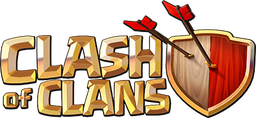
Clash of Clans is a freemium mobile strategy video game developed and published by Finnish game developer Supercell. The game was released for iOS platforms on August 2, 2012, and on Google Play for Android on October 7, 2013.
The Swapper is a puzzle-platform video game for Microsoft Windows, Mac OS X and Linux. It was developed and published by Facepalm Games, a small independent company based in Helsinki, Finland. Curve Studios later ported the game to PlayStation and Nintendo platforms in 2014. A science fiction-themed title, the player controls a female scavenger stranded aboard an abandoned research station, and discovers a strange device that allows her to create clones of herself and switch her consciousness between these clones. The player uses this ability to solve various puzzles and learn about the fate of the station's researchers. The Swapper was released on May 30, 2013 to critical acclaim, with reviewers praising the game's visual style and atmosphere, the quality of the puzzles, and the game's ability to innovate on already well-established game mechanics.
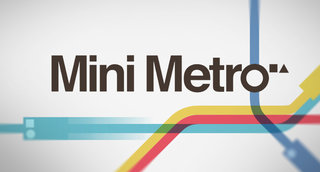
Mini Metro is a puzzle strategy video game developed by indie development team Dinosaur Polo Club. Players are tasked with constructing an efficient rail transit network for a rapidly growing city. Stations are represented by differently shaped nodes and players can build tracks to connect them by drawing lines. Levels are based on real cities and the appearance of stations and passengers is procedurally generated. The game's visual style makes use of bold colours and simple geometry to replicate the appearance of modern transit maps. The game uses a procedural audio system to generate sounds based on the player actions and transit network. The rhythms and sounds created took inspiration from works of minimal music.
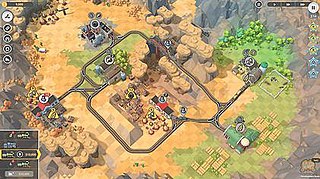
Train Valley 2 is a puzzle-strategy train simulator video game developed by Flazm as a sequel to Train Valley. It was released in early access on 29 March 2018, and fully released on 13 April 2019.

Bridge Constructor Portal is an engineering simulation and puzzle video game developed by ClockStone and published by Headup Games. The game is part of the Bridge Constructor series, and incorporates elements of Valve's Portal series, taking place in Aperture Laboratories. The game was released on Android, iOS, Linux, macOS and Windows in December 2017, and for the Nintendo Switch, PlayStation 4, and Xbox One in February 2018. By August 2018, the game had sold over 500,000 copies.

Manifold Garden is an indie first-person puzzle video game developed by American artist William Chyr. It was released on Windows, macOS, and iOS on October 18, 2019. The player must navigate an abstract series of structures that appear to repeat into infinity, while solving a progression of puzzles. Ports for PlayStation 4, Nintendo Switch and Xbox One were released on August 18, 2020. An upgraded version of the game is set to release for Xbox Series X and Series S as a launch title on November 10, 2020.
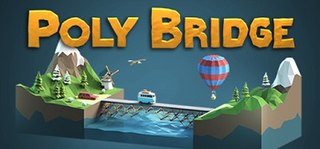
Poly Bridge is a bridge-building simulation-puzzle game, developed by New Zealand–based indie studio Dry Cactus with music by Canadian composer Adrian Talens, where players build bridges for vehicles to cross. Poly Bridge was released for Microsoft Windows on July 12, 2016, iOS on June 13, 2017. Steel, wood, rope, and cable can be combined and used to strengthen a designed bridge and "hydraulics" are used to move pieces of the bridge. The game is made more difficult with the availability of different building materials of different prices. A sequel to the game titled Poly Bridge 2 was released on May 28, 2020, for Windows, macOS, and Linux.














